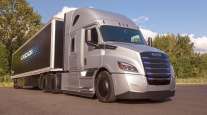ATA Asks Judges to Reconsider Decision Allowing California’s Reefer Rule to Stand
This story appears in the May 31 print edition of Transport Topics.
Lawyers for American Trucking Associations have filed a petition asking that all 13 federal appeals court judges with the District of Columbia Circuit reconsider a three-judge panel’s decision that let California’s “reefer retrofit” rule stand.
ATA has been challenging California’s transportation refrigeration unit rule since 2008 because it alleges the requirement is, in effect, a national rule because it requires compliance by any motor carrier that operates in California.
The Clean Air Act does not give states the authority to establish national standards for the control of emissions from new mobile sources, ATA said. That authority belongs to the U.S. Environmental Protection Agency.
However, a three-judge panel on the appeals court said in an April 2 decision that ATA’s argument was “weak.”
“The California rule does not require any other state to adopt California’s approach, and it does not apply anywhere but in California — and only to vehicles that have entered California,” the panel said.
In its new petition for review, ATA again argues that the rule “has the practical effect of imposing the vast majority of its impacts on out-of-state operators and regulating 75% of the nation’s refrigerated tractor-trailers — effectively allowing California to create a national engine emissions standard in violation of the [Clean Air Act].”
“TRUs are installed on more than 335,000 longhaul tractor-trailers across the United States that are responsible for the delivery of fresh fruits and vegetables, meats and dairy products, frozen foods, human blood, pharmaceuticals (e.g., insulin), and temperature-sensitive chemicals nationwide,” ATA’s new petition said.
ATA also said the TRU rule will require the vast majority of longhaul TRU carriers to operate split fleets, with some trailers dedicated exclusively to California and others ineligible to operate there.
The petition also faults EPA for granting California a waiver last year that allows the state to implement the rule. Although the rule was first approved by the California Air Resources Board in 2004, the state could not begin enforcing it until it gained EPA approval in 2009.
Robert Digges, ATA vice president and chief counsel, told Transport Topics he was encouraged by a partial dissenting opinion by the court’s Senior Circuit Judge Stephen Williams, who questioned EPA’s analysis in granting California’s waiver.
“The dissenting judge provided such a compelling analysis that we believe his view could well persuade the entire court to take another look,” Digges said. “It was never intended for California to create national rules, but that is just what the TRU does.” A CARB spokeswoman did not return a request for comment.
The TRU rule covers all refrigeration systems powered by diesel internal-combustion engines used to refrigerate or heat perishable products transported in various containers, including semitrailers, truck vans, shipping containers and railcars.
CARB has said that although TRU engines are relatively small, ranging from 9 horsepower to 36 hp, significant numbers of the engines congregate at distribution centers, truck stops and other facilities, resulting in the potential for health risks to those who live and work nearby.
CARB has been enforcing the first phase of the rule since January, requiring compliance for units manufactured in 2002 or earlier. In January and February, CARB conducted 2,800 inspections and issued 55 citations for failure to register TRUs and 157 citations for not meeting emissions requirements.
CARB currently is considering extending requirements for some unit models by as much as two years.




